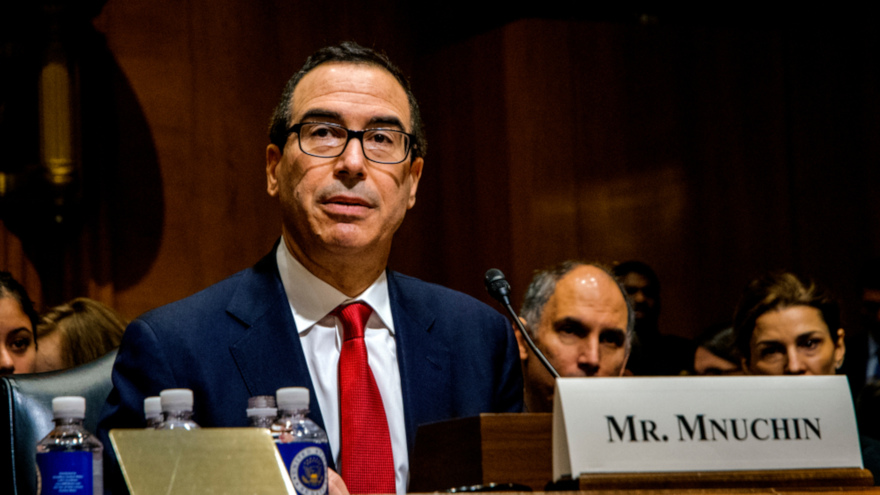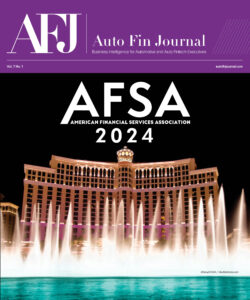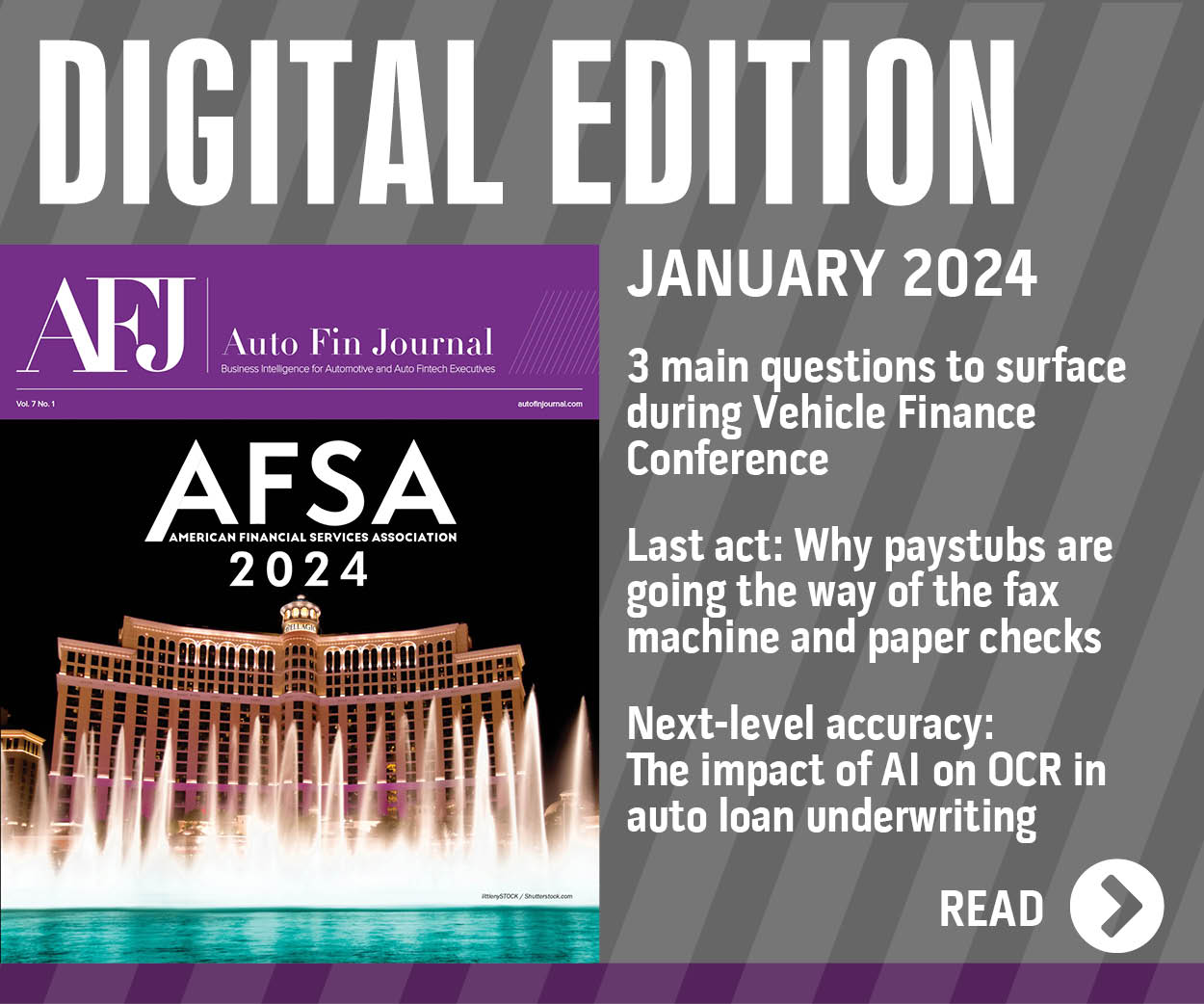Mixed reactions to latest federal Fintech regulation actions

Treasury Secretary Steven Mnuchin is pictured here during his Senate confirmation hearing. Photo by Mark Reinstein / Shutterstock.com
Two leading financial regulatory bodies — the U.S. Department of the Treasury and the Office of the Comptroller of the Currency — each took steps to involve themselves in the fintech space.
On Tuesday, the Treasury Department released a report identifying improvements to the regulatory landscape that officials said will better support nonbank financial institutions, embrace financial technology and foster innovation.
And on the same day, the OCC announced it will begin accepting applications for national bank charters from non-depository fintech companies engaged in the business of banking.
Industry representatives met both developments with upbeat reactions.
Dan Berger is president and chief executive officer of the National Association of Federally Insured Credit Unions (NAFCU).
“We support the concept of a special-purpose national bank charter for fintech companies. NAFCU believes that fintech companies require a minimum level of regulation and supervision to ensure a level playing field,” Berger said.
Rob Nichols is president and CEO of the American Bankers Association.
“America’s banks have been at the forefront of innovation since this country was founded, and today the financial technology offered by banks provides our customers unprecedented safety, security and convenience,” Nichols said.
“To ensure that innovation continues, it’s imperative that the federal government support the development of new technologies that will allow financial institutions to better serve their customers and communities while maintaining the safety and soundness we all want and deserve,” he added.
More details on Treasury report
In drafting the report, Treasury officials said they consulted extensively with a wide range of stakeholders focused on consumer financial data aggregation, lending, payments, credit servicing, financial technology and innovation.
The Treasury Department insisted that its recommendations are designed to facilitate U.S. firm innovation by streamlining and refining the regulatory environment. The regulator said these improvements should enable U.S. firms to more rapidly adopt competitive technologies, safeguard consumer data and operate with greater regulatory efficiency.
Treasury’s report identified just over 80 recommendations that are designed to:
— Embrace the efficient and responsible use of consumer financial data and competitive technologies
— Streamline the regulatory environment to foster innovation and avoid fragmentation
— Modernize regulations for an array of financial products and activities
— Facilitate “regulatory sandboxes” to promote innovation
“American innovation is a cornerstone of a healthy U.S. economy. Creating a regulatory environment that supports responsible innovation is crucial for economic growth and success, particularly in the financial sector,” Treasury Secretary Steven Mnuchin said.
“America is a leader in innovation,” Mnuchin continued. “We must keep pace with industry changes and encourage financial ingenuity to foster the nation’s vibrant financial services and technology sectors.”
Nichols had more glowing things to say about the Treasury report, which can be downloaded here.
“We are encouraged to see that the Treasury Department’s fintech report recognizes the innovative technologies banks have already deployed and will continue to develop, both on their own and in partnership with others,” Nichols said. “We continue to review the recommendations in the report, but we appreciate that many of the ideas are consistent with the principles set forth in the white paper ABA sent to Treasury earlier this year.
“In particular, we welcome the flexibility Treasury recommends in allowing banks to partner with financial start-ups to deliver new products through trusted channels and the need for sensitive customer financial data remain protected,” Nichols continued.
“ABA will carefully review Treasury’s payments recommendations to ensure they reflect the market-based approaches that serve customers so well today. We also want to commend Treasury’s encouragement to regulators to keep pace with the impressive financial innovations reaching consumers every day,” he went on to say.
Expert questions OCC action
While the Treasury report seemed to be embraced, at least one legal expert in the financial sector offered an in-depth critique of the OCC’s actions.
Joseph Lynyak III is a partner at the international law firm Dorsey & Whitney and one of the nation’s experts on Dodd-Frank, regulatory reform and the Consumer Financial Protection Bureau. His practice includes providing financial intermediaries advice in the areas of regulatory and strategic planning, application and licensing, legislative strategy, commercial and consumer lending, examination, supervision and enforcement, and general corporate matters.
“The OCC’s policy statement on fintech charters (and its licensing manual supplement) is one of two things: It is either an attempt to eliminate the issue by setting an insurmountably high standard to obtain a national bank charter or else a policy change that will ultimately be a disaster because of the nature of fintech companies,” Lynyak said.
The OCC explained that its decision is consistent with bi-partisan government efforts at federal and state levels to promote economic opportunity and support innovation that can improve financial services to consumers, businesses, and communities. The decision was documented in a policy statement and supplement to the OCC’s Licensing Manual, both published this week and available here.
The OCC added that its decision follows extensive outreach with many stakeholders over a two-year period. In announcing the decision, the policy statement and comptroller’s licensing manual supplement stress:
— Every application will be evaluated on its unique facts and circumstances.
— FinTech companies that apply and qualify for, and receive, special purpose national bank charters will be supervised like similarly situated national banks, to include capital, liquidity and financial inclusion commitments as appropriate. FinTech companies will be expected to submit an acceptable contingency plan to address significant financial stress that could threaten the viability of the bank. The plan would outline strategies for restoring the bank’s financial strength and options for selling, merging or liquidating the bank in the event the recovery strategies are not effective.
—The expectations for promoting financial inclusion will depend on the company’s business model and the types of planned products, services and activities.
— New FinTech companies that become special purpose national banks will be subject to heightened supervision initially, similar to other de novo banks.
— The OCC has the authority, expertise, processes, procedures and resources necessary to supervise fintech companies that become national banks and to unwind a fintech company that becomes a national bank in the event that it fails.
“Over the past 150 years, banks and the federal banking system have been the source of tremendous innovation that has improved banking services and made them more accessible to millions. The federal banking system must continue to evolve and embrace innovation to meet the changing customer needs and serve as a source of strength for the nation’s economy,” Comptroller of the Currency Joseph Otting said.
“The decision to consider applications for special purpose national bank charters from innovative companies helps provide more choices to consumers and businesses, and creates greater opportunity for companies that want to provide banking services in America,” Otting continued. “Companies that provide banking services in innovative ways deserve the opportunity to pursue that business on a national scale as a federally chartered, regulated bank.”
Despite what Otting and the OCC are looking to accomplish, Lynyak still has plenty of skepticism.
“With the exception of an extremely small group of companies (those operating in the payments arena), the funding and operational difficulties presented by a non-insured FinTech national bank are enormous,” Lynyak said. “For example, since FinTech companies are notorious for changing their business plans frequently, it is beyond reasonable belief that a FinTech national bank will not at some point accept deposits — which changes it into a run-of-the mill national bank. If that occurs and it fails, will the FDIC step in if has not granted deposit insurance?
“Since embedded in the notion of a fintech charter is the probability that an affiliated group of persons or companies will act as a source of strength for the fintech charter,” he continued, “how will that concern be evaluated and measured as the fintech bank grows?”
“If a fintech charter will engage in lending, without deposits to rely upon for growth, significant risk is created if the fintech charter originates and sells into the secondary market — creating recourse risk and concentration concerns that the OCC should not tolerate,” Lynyak went on to say.
“It is hard to conceive that insured national banks will allow the OCC to allow a fintech entity a national bank charter without insisting that all national bank obligations apply—which is what fintech companies want to avoid,” Lynyak added.
Meanwhile, the OCC reiterated that qualifying fintech companies also may apply for federal charters under its authority to charter full-service national banks and other special purpose banks, such as trust banks, banker’s banks, and credit card banks.
The regulator went on to mention a national bank charter is only one option among many for companies engaged in the business of banking. Other options include pursuing state banking charters, appropriate business licenses, and partnerships with other federal or state financial institutions. The option to apply for a national bank charter allows these companies to choose the best business model and regulatory structure for their business and strategic goals, which will help them meet the needs of their customers throughout the nation.
“Providing a path for fintech companies to become national banks can make the federal banking system stronger by promoting economic growth and opportunity, modernization and innovation, and competition,” Otting said. “It also provides consumers greater choice, can promote financial inclusion, and creates a more level playing field for financial services competition.”
Despite Lynyak having his reservations, Nichols welcomed the moves by the OCC.
“On the heels of the Treasury report, we are pleased to see the Office of the Comptroller of the Currency moving forward with their new FinTech charter that maintains the strict safety and soundness requirements all banks face today,” Nichols said.
“Today’s OCC announcement supports a dynamic banking industry where all players must meet the same high standards, face the same regulatory oversight and share the same affirmative responsibility to serve their communities,” he continued.
“We look forward to working with Treasury, OCC and the other relevant regulatory agencies in charting a future that gives all Americans access to the financial products they want and need,” Nichols went on to say.

 View The Latest Edition
View The Latest Edition

